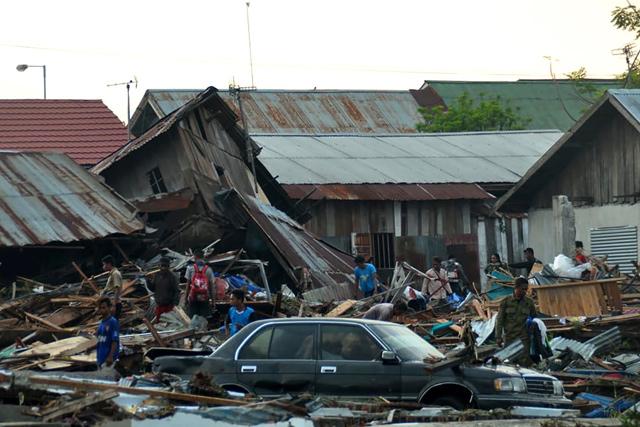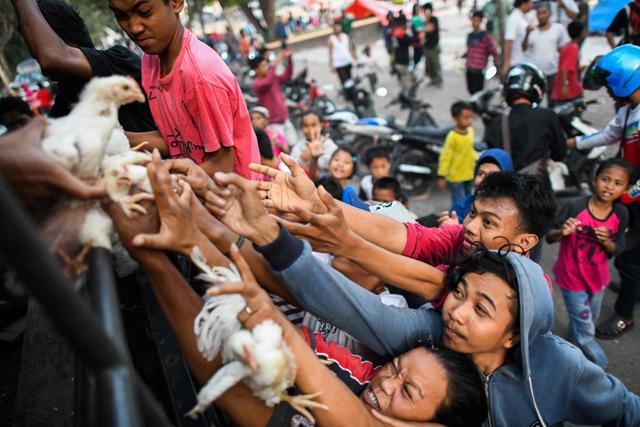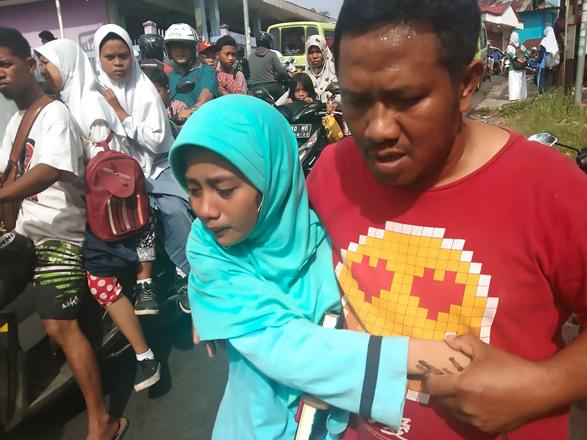You are here
Power restored to Indonesian quake city, but fate of thousands unknown
By Thomson Reuters Foundation - Oct 04,2018 - Last updated at Oct 04,2018

Indonesian children access usable water at a temporary camp in Palu in Central Sulawesi on Thursday, after an earthquake and tsunami hit the area on September 28 (AFP photo)
PALU, Indonesia — Electricity was restored and some shops re-opened in Indonesia's quake and tsunami stricken city of Palu on Thursday, but the fate of many thousands of people in outlying districts was unknown nearly a week after the disaster struck.
The small city of 370,000 people has been the focus of the aid effort launched after last Friday's 7.5 magnitude earthquake and tsunami on the west coast of Sulawesi island.
International help in searching for survivors has gathered pace, but communities in more remote areas have been cut off by broken roads, landslides and crippled communications, leaving people increasingly desperate for basic needs as aid has only just begun to trickle through.
By Thursday, the official death toll stood at 1,424, but it will certainly rise as bodies were still being recovered in Palu, where most of the dead have been counted. Figures for more remote areas were only trickling in, if at all.
"There are so many challenges with this disaster, it's never been so bad," said Frida Sinta, an aid volunteer trying to get basic food and other supplies out to fellow residents of Palu.
The city, 1,500 km northeast of Indonesia's capital, Jakarta, has teetered close to chaos this week, with outbreaks of looting, but a recovery was evident as some shops and banks reopened and a major mobile phone network was back up.
Orderly queues formed at petrol stations after the arrival of fuel shipments and late in the day, traffic lights and televisions flickered back to life as the power came back on.
The improvements are helping with the aid effort.
"We carry whatever we can by car or motorbike within the city wherever we can. But not yet to the most inaccessible places," Sinta said.
Altogether, the badly affected areas in the disaster zone include some 1.4 million people.
Rescue workers are pushing into outlying districts, where residents say they have been scavenging for coconuts, bananas and cassava.
Villagers rushed a Red Cross helicopter that landed near the town of Donggala, northwest of Palu, to distribute bread and other food, a Reuters photographer said.
National disaster mitigation agency spokesman Sutopo Purwo Nugroho told a briefing the main roads to the south, west and east of Palu had been opened.
But there has been scant information about conditions on the road to the north, along the coast towards the epicentre of the quake, 78 km from Palu.
"There's no data," said Abdul Haris of the national search and rescue agency, when asked about the string of small settlements that line the road, which passes some sandy beaches that attract a trickle of tourists.
Related Articles
PALU, Indonesia — Nearly 400 people were killed when a powerful quake sent a tsunami barrelling into the Indonesian island of Sulawesi, offi
PALU, Indonesia (Reuters) — Indonesian President Joko Widodo called for reinforcements in a desperate search for survivors of a devastating
AMBON CITY, Indonesia — Four people have died after a strong earthquake struck Indonesia's remote Maluku islands on Thursday, destroying hom



















